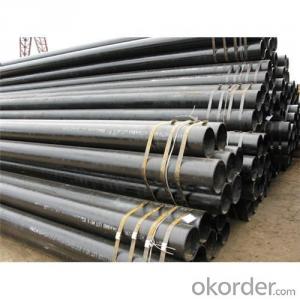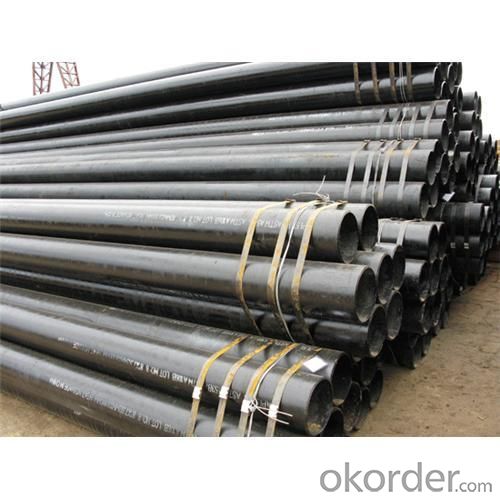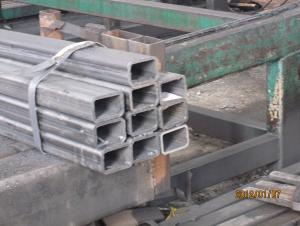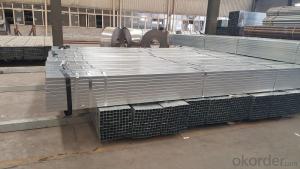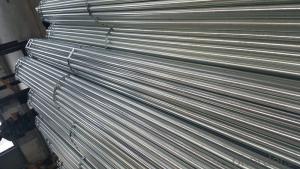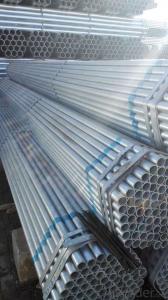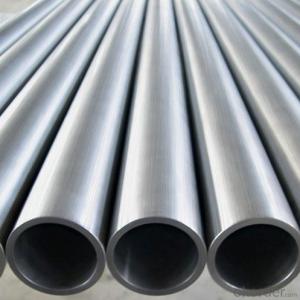Water Pipe Wteel Linepipe Steel Water Linepipe Steel Linepipe for Conveying Water
- Loading Port:
- Tianjin
- Payment Terms:
- TT OR LC
- Min Order Qty:
- 25 m.t.
- Supply Capability:
- 7000 m.t./month
OKorder Service Pledge
OKorder Financial Service
You Might Also Like
1、Structure of Steel water linePipe API SPEC 5CT:
Steelwater linePipe is to be used for conveying gas, water, and petroleum and natural gas industries,etc. And used for structural steel pies purpose. As the manufacturing process does not include any welding, seamless pipes are perceived to be stronger and more reliable. Historically seamless pipe was regarded as withstanding pressure better than other types, and was often more easily available than welded pipe.
2、Main Features of Steel water linePipe API SPEC 5CT:
• High manufacturing accuracy
• High strength
• Small inertia resistance
• Strong heat dissipation ability
• Good visual effect
• Reasonable price
3、Steel water linePipe API SPEC 5CT: Specification:
Standard | GB, DIN, ASTM ASTM A106-2006, ASTM A53-2007 |
Grade | 10#-45#, 16Mn 10#, 20#, 45#, 16Mn |
Thickness | 8 - 33 mm |
Section Shape | Round |
Outer Diameter | 133 - 219 mm |
Place of Origin | Shandong, China (Mainland) |
Secondary Or Not | Non-secondary |
Application | Hydraulic Pipe |
Technique | Cold Drawn |
Certification | API |
Surface Treatment | factory state or painted black |
Special Pipe | API Pipe |
Alloy Or Not | Non-alloy |
Length | 5-12M |
Outer Diameter | 21.3-610mm |
Grade | 20#, 45#, Q345, API J55, API K55, API L80, API N80, API P110, A53B |
Standard | ASME, ASTM |
1) Material:20#(ASTM A 106/A53 GRB.API5LGRB,GB),45#,16Mn,10#.
2) Specification range:OD:21.3-610mm,WT:6-70mm,length:6-12m or according to the requirement of clients.
3) Excutive standards:GB,ASME API5L.ASTM A 106/A53,Despite of the above standards,we can also supply seamless steel pipe with standard of DIN,JIS,and so on,and also develop new products according to the requirements of our clients!
4) Surface:black lacquered,varnish coating or galvanized.
5) Ends:Beveled or square cut,plastic capped,painted.
6) Packing:bundles wrapped with strong steel strip,seaworthy packing.
4、Packaging & Delivery
Packaging Details: | seaworthy package,bundles wrapped with strong steel strip |
Delivery Detail: | 15-30days after received 30%TT |
5、FAQ of Steel water linePipe API SPEC 5CT:
①How is the quality of your products?
Our products are manufactured strictly according to national and internaional standard, and we take a test
on every pipe before delivered out. If you want see our quality certifications and all kinds of testing report, please just ask us for it.
Guaranteed: If products’ quality don’t accord to discription as we give or the promise before you place order, we promise 100% refund.
②How about price?
Yes, we are factory and be able to give you lowest price below market one, and we have a policy that “ for saving time and absolutely honest business attitude, we quote as lowest as possible for any customer, and discount can be given according to quantity”,if you like bargain and factory price is not low enough as you think, just don’t waste your time.Please trust the quotation we would give you, it is professional one.
③Why should you chose us?
Chose happens because of quality, then price, We can give you both.Additionally, we can also offer professional products inquiry, products knowledge train(for agents), smooth goods delivery, exellent customer solution proposals.Our service formula: good quality+good price+good service=customer’s trust
SGS test is available, customer inspection before shipping is welcome, third party inspection is no problem.
6、 Steel water linePipe API SPEC 5CT: Images:
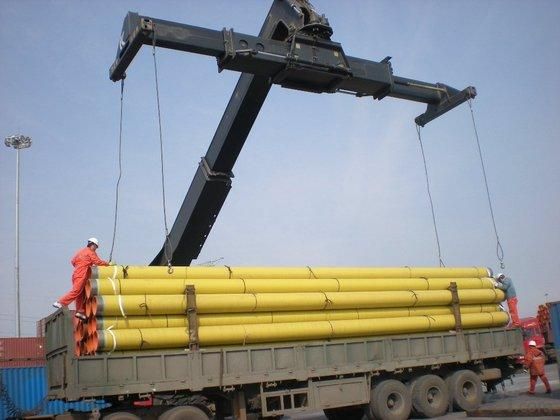
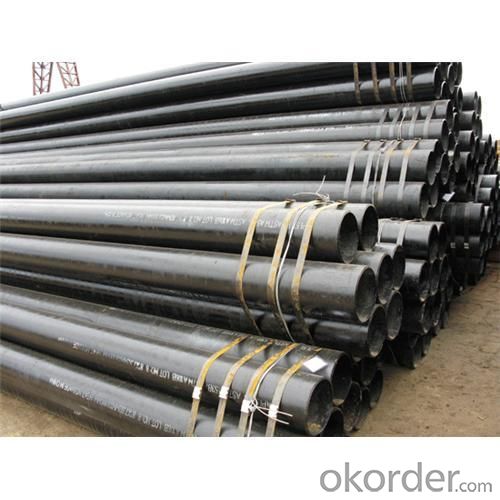
- Q: What is the standard length of a steel pipe?
- The standard length of a steel pipe can vary depending on the industry and application. However, in general, the standard lengths of steel pipes range from 18 to 24 feet. These lengths are commonly used in construction, plumbing, and other industrial applications. It is important to note that custom lengths can also be obtained to suit specific project requirements.
- Q: Does the seamless steel pipe need rust removal?
- Spray (throw) shoot derusting by the high-power motor to drive the spray shot (impeller) blade rotating speed, the steel grit, steel shot, iron wire, minerals and other abrasive jet for 20# seamless steel tube surface under the action of centrifugal force (left) radiation treatment, not only can completely remove the dirt and rust, oxide, and the role of 20# seamless steel in abrasive blast and friction force, can achieve the required uniform roughness.Not only can the physical adsorption effect on the surface of the pipe be increased, but also the mechanical adhesion of the anticorrosive layer to the pipe surface can be enhanced. Therefore, spraying (throwing) shot derusting is an ideal method of rust prevention for pipeline corrosion protection. Generally speaking, shot peening (sand) derusting is mainly used in the inner surface treatment of tubes, shot blasting (sand) derusting is mainly used for the outer surface treatment of tubes.
- Q: Can steel pipes be insulated for thermal efficiency?
- Yes, steel pipes can be insulated for thermal efficiency. Insulating steel pipes helps to reduce heat loss or gain, depending on the application. The insulation material is typically wrapped around the pipes to create a protective barrier. This helps to prevent heat transfer from the pipes to the surrounding environment or vice versa. Insulating steel pipes can significantly improve energy efficiency by reducing the amount of energy required to heat or cool the fluid flowing through the pipes. It is a common practice in various industries such as HVAC, oil and gas, and industrial processes where temperature control is critical. Additionally, insulation also helps to prevent condensation and corrosion on the outer surface of the pipes. Overall, insulating steel pipes is a cost-effective solution to enhance thermal efficiency and reduce energy consumption.
- Q: What are the different grades of steel pipes?
- There are several different grades of steel pipes, including carbon steel, stainless steel, and alloy steel. Each grade has its own unique properties and is used for specific applications based on factors such as strength, corrosion resistance, and temperature resistance.
- Q: Can steel pipes be used for underground pressure pipelines?
- Underground pressure pipelines can indeed utilize steel pipes. Renowned for their robustness and endurance, steel pipes are well-suited for diverse applications, including underground pressure pipelines. They possess the capability to withstand high pressure and exhibit resistance to corrosion, rendering them a dependable choice for subterranean transportation of fluids or gases. Moreover, steel pipes offer versatility in terms of size and thickness, enabling customization to meet the specific requirements of any pipeline undertaking. Nevertheless, it is crucial to ensure adequate coating or lining of the steel pipes to avert corrosion resulting from soil conditions or the conveyed substance. Regular maintenance and inspections are also imperative to guarantee the integrity and longevity of underground pressure pipelines constructed with steel pipes.
- Q: How do you calculate the pipe pressure drop for steel pipes?
- To determine the pressure drop in steel pipes, there are two equations that can be utilized: the Darcy-Weisbach equation and the Hazen-Williams equation. The Darcy-Weisbach equation, although more precise, necessitates a greater amount of information. It takes into consideration the diameter, length, roughness, fluid flow rate, as well as fluid properties like viscosity and density. The equation is expressed as: To calculate the pressure drop (ΔP), the following formula can be used: (f * L * ρ * V^2) / (2 * D) In this formula: - ΔP denotes the pressure drop - f represents the friction factor (which can be determined using Moody's chart or empirical equations such as the Colebrook-White equation) - L signifies the length of the pipe - ρ denotes the fluid density - V represents the fluid velocity - D signifies the pipe diameter On the other hand, the Hazen-Williams equation is a simplified version commonly employed for water flow calculations. Although less accurate, it is more user-friendly. The equation is expressed as: To calculate the pressure drop (ΔP), the following formula can be used: K * Q^1.85 / (C^1.85 * d^4.87) In this formula: - ΔP denotes the pressure drop - K signifies the Hazen-Williams coefficient (which relies on the pipe material and roughness) - Q represents the flow rate - C signifies the Hazen-Williams roughness coefficient - d denotes the pipe diameter It is crucial to note that these equations provide estimations of the pressure drop, and actual conditions may vary due to factors such as fittings, bends, and valves in the pipe system. Furthermore, consistency in unit usage (e.g., SI units or US customary units) is of utmost importance when employing these equations.
- Q: How are steel pipes used in the manufacturing of agricultural machinery?
- Steel pipes are commonly used in the manufacturing of agricultural machinery for various purposes such as structural support, fluid transportation, and protection. They are utilized to create the framework and chassis of the machinery, providing strength and durability. Steel pipes are also used to transport fluids such as fuel, water, and chemicals throughout the machinery. Additionally, steel pipes can be used to protect vulnerable components from external elements, ensuring the longevity and reliability of the agricultural machinery.
- Q: Can steel pipes be used for fire protection systems?
- Yes, steel pipes can be used for fire protection systems. Steel pipes are commonly used in fire sprinkler systems because they have high strength and durability, making them suitable for carrying pressurized water to extinguish fires. Steel pipes also have fire-resistant properties, which further enhances their suitability for fire protection systems.
- Q: What are the factors to consider when selecting the right steel pipe for a specific application?
- There are several factors to consider when choosing the appropriate steel pipe for a particular application. These factors encompass: 1. Compatibility with materials: Ensuring that the steel pipe is compatible with the substance it will transport or contain is crucial. Different materials may necessitate specific types of steel pipes to prevent corrosion or contamination. 2. Pressure and temperature requirements: The pressure and temperature conditions that the steel pipe will face should be taken into account. This will determine the necessary thickness and strength of the pipe to ensure it can withstand the intended operating conditions. 3. Size and dimensions: Selecting the size and dimensions of the steel pipe should be based on the flow rate, volume, and available installation space. It is vital to choose a pipe with the appropriate diameter and wall thickness to prevent flow restrictions or leaks. 4. Environmental conditions: The environment in which the steel pipe will be installed must be considered. Factors such as exposure to moisture, chemicals, or extreme temperatures may necessitate the use of specific coatings or materials to enhance the longevity and durability of the pipe. 5. Cost considerations: The cost of the steel pipe and its installation should be taken into account. Striking a balance between desired quality and available budget is essential to ensure the most cost-effective solution. 6. Regulatory compliance: Depending on the application, there may be specific industry regulations or standards that must be adhered to. Choosing a steel pipe that meets these requirements is important to ensure compliance and avoid any legal or safety issues. 7. Maintenance and lifespan: The maintenance requirements and expected lifespan of the steel pipe should also be considered. Some applications may require regular inspections or replacements, while others may require a more durable and long-lasting pipe. By carefully considering these factors, it is possible to select the appropriate steel pipe for a specific application that meets the desired performance, durability, and safety requirements.
- Q: What are the factors affecting the price of steel pipes?
- The price of steel pipes can be influenced by various factors. These factors encompass: 1. Raw material expenses: The cost of raw materials like iron ore and coal significantly influences the price of steel pipes. Fluctuations in commodity prices can impact the overall production cost and subsequently affect the selling price. 2. Supply and demand dynamics: The price of steel pipes is determined by the interplay of supply and demand. When there is high demand and limited supply, prices tend to rise. Conversely, an oversupply and low demand can lead to price decreases. 3. Production and manufacturing costs: The direct impact of production and manufacturing expenses on steel pipe prices cannot be overlooked. Costs related to labor, energy, transportation, and equipment maintenance all contribute to the overall production cost and, consequently, the selling price. 4. Market competition: The level of competition within the steel pipe industry also influences prices. Increased competition among manufacturers and suppliers can result in more competitive pricing. Conversely, fewer competitors may lead to higher prices due to limited options. 5. Government policies and regulations: Government policies and regulations exert a significant influence on steel pipe prices. Import tariffs, trade restrictions, and environmental regulations can all affect production costs and subsequently impact prices. 6. Currency exchange rates: Currency exchange rates can also sway steel pipe prices. Fluctuations in exchange rates between countries can impact the cost of importing or exporting steel pipes, which in turn affects their selling price. 7. Global economic conditions: The overall state of the global economy can have repercussions on steel pipe prices. During periods of economic growth, demand for steel pipes may increase, leading to higher prices. Conversely, economic downturns can result in decreased demand and subsequently lower prices. It is vital to acknowledge that these factors can interact and fluctuate over time, making the pricing of steel pipes a complex and ever-changing process.
Send your message to us
Water Pipe Wteel Linepipe Steel Water Linepipe Steel Linepipe for Conveying Water
- Loading Port:
- Tianjin
- Payment Terms:
- TT OR LC
- Min Order Qty:
- 25 m.t.
- Supply Capability:
- 7000 m.t./month
OKorder Service Pledge
OKorder Financial Service
Similar products
Hot products
Hot Searches
Related keywords
